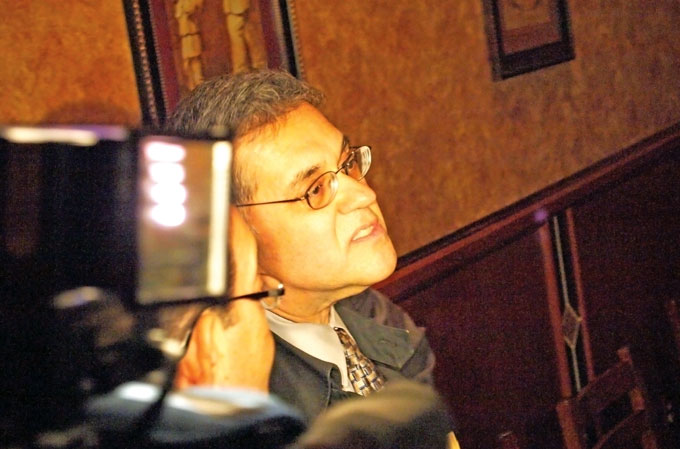Dinner Among Friends
by Geoff Kelly

It was a last supper for Common Council President Dave Franczyk. And it was a first supper for his probable successor, Lovejoy Councilman Rich Fontana, who has gathered the votes he needs to wrest the presidency from Franczyk.
Last week, the city clerk’s office sent out a piece of official correspondence to all nine members of Common Council notifying them that, “upon the request of at least Five Councilmembers, the Re-organization meeting has been called to be held at Francescas Restaurant,” which is a swanky new addition to Seneca Street’s business corridor. At the meeting, presumably, a vote would be taken, in which four councilmembers friendly with Mayor Byron Brown—Masten’s Demone Smith, Ellicott’s Darius Pridgen, North’s Joe Golombek, and University’s Bonnie Russell—would add their votes to Fontana’s to end Franczyk’s presidency. In executive session, the new majority would determine the status of the 17 shared staff positions the Common Council controls, including jobs in the city clerk’s office and the city clerk position itself.
Sticking with Franczyk were South’s Mickey Kearns, Delaware’s Mike LoCurto, and Niagara’s David Rivera. Initially Kearns was prepared to support Fontana, but withdrew his support when he could not win from Fontana the promises he needed.
Franczyk alerted the media to the meeting, asserting that it had been called improperly and violated both city procedures and state open meetings law. He argued that a member of the city’s law department should be present, for example, and the well appointed back room at Francesca’s hardly allowed adequate room for members of the public to attend, as state law requires. (Fontana points out that the Common Council’s re-organization meetings are traditionally held at dinners in the back rooms of restaurants in the holiday season. The last one, he says, took place at the Armory Restaurant on Niagara Street.) Franczyk and Fontana argued in front of cameras from three local TV stations, as well as writers for this paper and their attorney.
In the end, Fontana acquiesced to Franczyk’s objections: The re-organization meeting was cancelled, and the nine legislators simply sat down to dinner together instead. No public business was discussed, even when the four members of the new minority excused themselves after about an hour or so, leaving the new majority to themselves.
The following day, Fontana held a press conference to announce that the city’s law department had backed him up, opining that the meeting he’d called was legal. In any case, Fontana can afford to be patient: He has the votes to become president, and he’s not likely to lose them.
In recent weeks, some of Franczyk’s supporters suggested that they might back a compromise candidate such as Pridgen, whose clout as a minister might allow him to exert independence from his ally, the mayor, where he saw fit. By contrast, Franczyk’s supporters view Fontana as too easily manipulated by the mayor’s office. They point to last year’s debate over the supposedly urgent need for the city to transfer the Webster Block to the Erie Canal Harbor Development Corporation or risk losing HSBC downtown. During that largely manufactured crisis, Fontana took the mayor’s part, while Franczyk and the rest of the majority coalition worked out a solution that protected the city’s interest in the property. They worry that Fontana feels indebted to Brown because the mayor called off a potential primary opponent to Fontana, former councilmember Charley Fisher, this fall. Franczyk questioned Fontana’s choice of Smith to succeed him as majority leader, citing not only Smith’s lockstep with the mayor’s office on nearly everything but Smith’s status as a co-defendant with the mayor in the civil suit filed by the NRP Group of Cleveland, which accuses the city of scuttling a real estate development deal after NRP refused to provide a contract for Reverend Richard A. Stenhouse, a Brown ally. What happens if the Common Council is asked to ratify some sort of settlement to make that lawsuit go away?
They also worry that Fontana will fire many long-term staffers, as inevitably occurs when a new majority forms and takes power. In fact, Fontana says that he brought to that table a proposal whereby every legislator would be allowed to protect one of the 17 employees in question, and Franczyk would be able to protect two. So 10 staffers would retain their jobs and seven would be replaced. Fontana said he didn’t know if that proposal would survive Tuesday night’s theatrics.
After the re-organization was cancelled but before dinner, Kearns praised Francesca’s, which sits in the district he represents, for its fine food and its industrious owner, Steve Marchione. “He took a dilapidated building and turned it into a neighborhood jewel, doing most of the work himself,” Kearns said.
“I don’t know if I’m going to stay for dinner,” he added. “My stomach is a little upset from the events of tonight.”
But he stayed. They all did. “It actually got pretty friendly after you guys left us,” said Smith, referring to the media. Fontana says he’ll call for a new re-organization meeting soon.
blog comments powered by Disqus|
Issue Navigation> Issue Index > v10n50 (Last Minute Gift Guide, week of Thursday, December 15) > Week in Review > Dinner Among Friends This Week's Issue • Artvoice Daily • Artvoice TV • Events Calendar • Classifieds |









 Current Issue
Current Issue